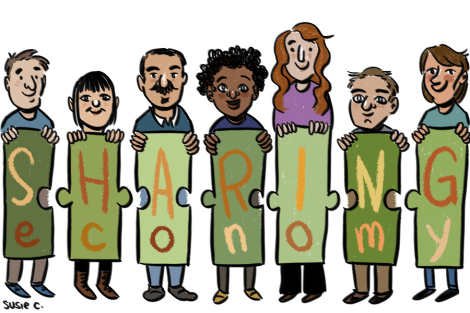Social discovery as an Economy
SoLoMo this, proximity networking that. Everybody knows what I’m
talking about. Connecting people because they are nearby [Highlight],
stealing people’s check-ins from Foursquare [Banjo], lumping 8 people together randomly after charging them 30 dollars [grubwithus] – is actually hurting the concept of connecting authentically with new people.
Social discovery as a concept has come a long way from the days of
Orkut, Meetup.com, and conferences.
Check out LetsLunch
Social discovery comes in many sizes, shapes and colors. For example,
in a sharing economy, you are getting a certain need fulfilled while being around someone you are meeting for the first time. Think Airbnb, Lyft, and Vayable.
The sharing economy, the connecting economy, and the “disrupting
craigslist” economy are all nothing but social discovery in a context
useful for certain
particular uses. It’s sharing your time/talent/treasure/passion. Call it
Social Discovery 2.0.
The internet brought with it the problem of people sharing all of their
time online. New problems bring new solutions, which gave rise to the
phenomenon of the sharing economy where you get to feel the same heart
racing of meeting people PLUS getting one of your needs met – as if the
solution lies in hitting the problem indirectly.
The basic urge of being in touch with other humans found multiple
channels combined with other needs such as saving money, utilizing
time properly, finding the right resources, etc. This has led to us
becoming smarter and more resourceful as well as more and more productive.
The question is: will it last? Do you get those frequent LinkedIn
requests requests from strangers to connect? Do you accept the
requests and then wonder what to do next? These people are still
complete strangers to you though now they are your connection, you
have just read their profile and probably know their name and their
job title. Does this action explain the human psychology?
As long as we are seeing the human connections and needs not being met
like the era of 1960’s and earlier, where you used to know all of your
neighbors, relatives, festival buddies. these sites will thrive.
Why, despite all of the improvements in education, standard of living,
economic mobility, and poverty, are we MORE hungry for personal
connections. And why is it that the more connected we get, the more
isolated we feel?
Despite us all being in more constant communication than ever,
research finds an increase in narcissism, loneliness, and depression
in the developed world over the past few decades.
Why is Groupon failing while E-Bay is still thriving? It’s because E-bay has the pulse rising effect of dealing with another human being on the other side. This explains why Craigslist is still one of the top 10 sites in the world. Not to forget Twitter which equally connects you with strangers too.
Modern capital life in all its goodness focuses on having us make
more money, buy more toys and be knowledge hordes of whats happening
to anyone anywhere anytime in the world. As we become more reliant on our iPhones, and more “connected” through Facebook, we can actually
become more disconnected from each other. Real connection is what we
crave. Yes, Facebook really did ruin everything. The explosion in
communication technologies over the past decades has re-oriented
society and put more psychological strain on us all to find our
identities and meaning.
There’s an immediacy available when we put down our smart phones and
dive into the present moment at a festival. Because what we need are
IRL (In Real Life) experiences, while we drown in a sea of URLs.
Social discovery 2.0 is its antidote to start putting us back in touch
with people.
What is the future of this trend? It’s social disovery 3.0 as simple as that.
Technology/trend evolves in three stages.
The first phase is when it shows its possible to do something.
In the second stage it becomes the cool thing to do. And finally, it
reaches a point where it becomes essential to do it. It follows the
progression: Friendster -> Myspace -> Facebook.
Social discovery 3.0 will be the stage where meeting new people will
become essential where to keep your career well oiled by having a good
network of professional contacts, becoming a global nomad – speaking
multiple languages and having a lifestyle that pays for it or simply
keeping your empathy intact by having dozes of real world connection
with people to be able to walk a mile in their shoes. Of course all driven by relevant context. Networking with varied people of multiple
talent is just limited to the upper class circles even today. However
in the last stage it will be easily accessed and adopted by even
common man whether in a village in India or most of the Europe.
Remember its not what you know but who you know!
Above all, at the end of the day, this is all about
relationships – real connections and interactions.


Great post. There are a lot of correlations that could be made with the world of online dating too. In my past experience with this, I had always found it best to limit the online aspect and try to meet in person ASAP. People represented “on paper” are a ridiculously poor substitute compared to dynamic real world interactions.
What do you think about putting Path after Facebook as a future progression of social networking? For instance, Path better executes the reasons families sign up for Facebook (ie. connecting you to people you actually care about).
Anyway, I hope Lets Lunch keeps pushing tech to enhance real life!